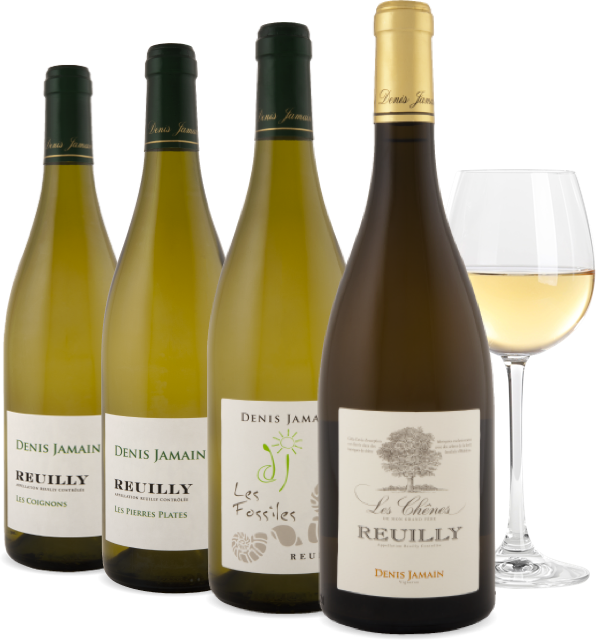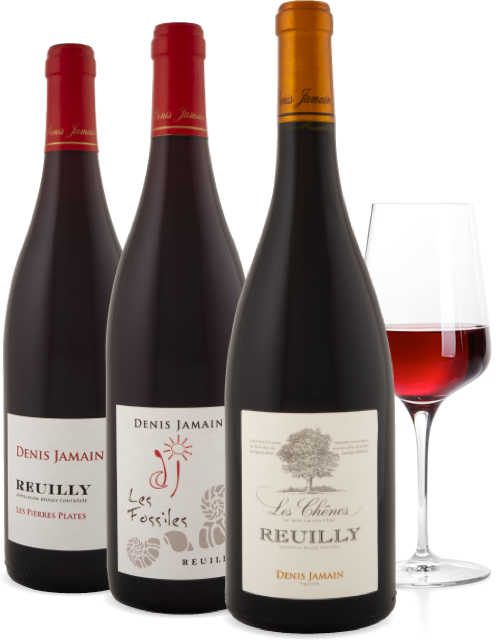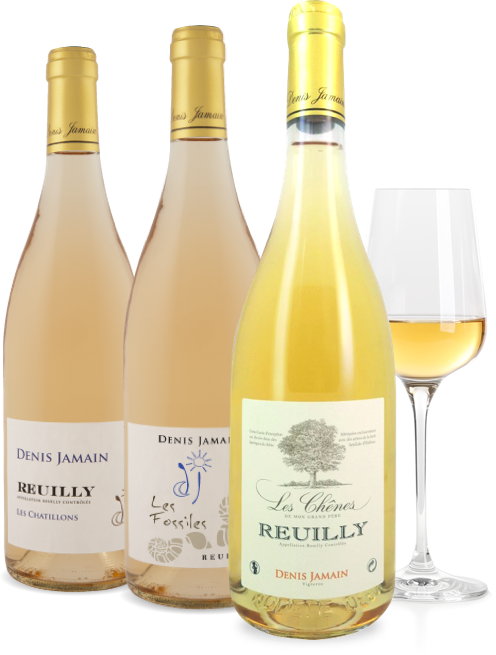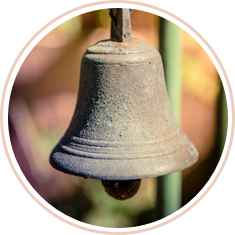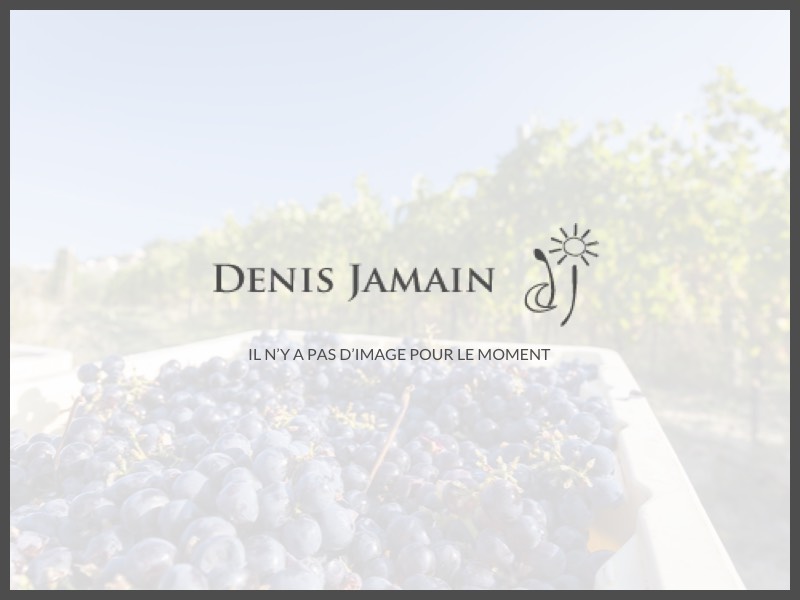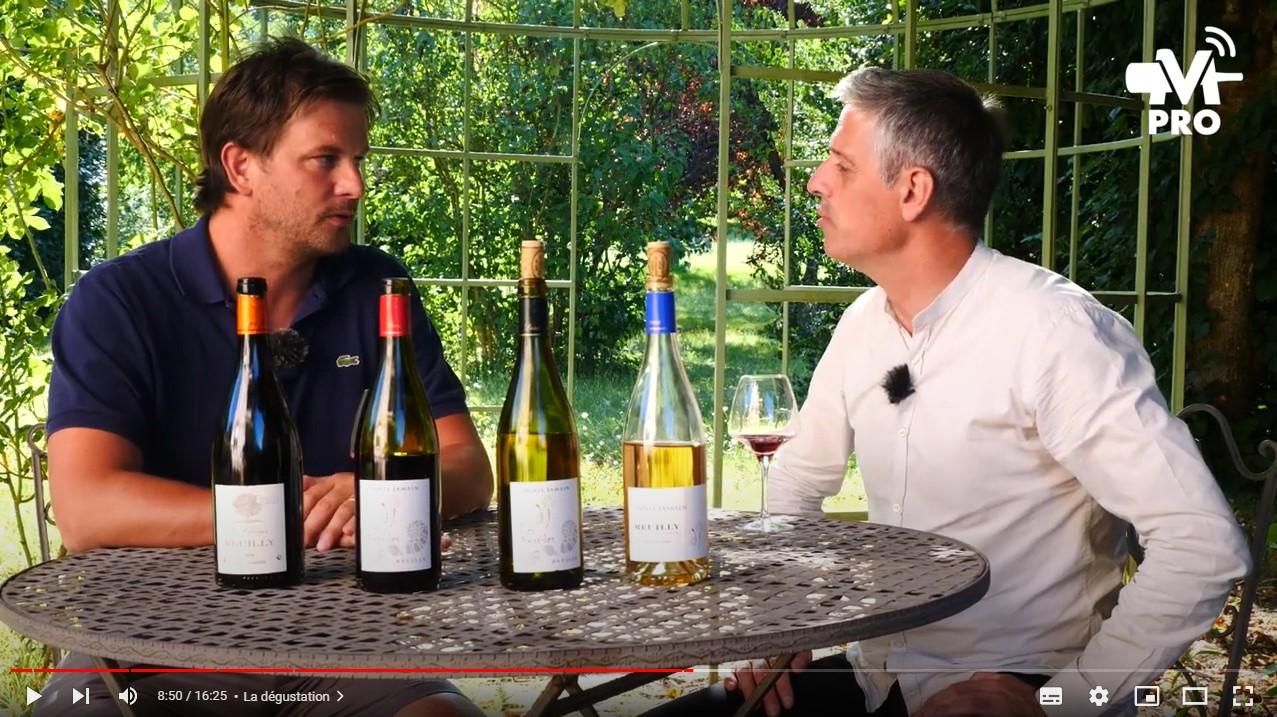Our Estate at Reuilly (36)
Reuilly's Vineyard has a long story... Very long story since the very first vines of Reuilly were entrusted in the 7th century by King Dagobert to the monks of the Royal Abbey of St-Denis.
It was in 1935 that Camille Rousseau, the maternal grand-father of Denis Jamain, settled in Reuilly and planted his very first white Sauvignon vines.
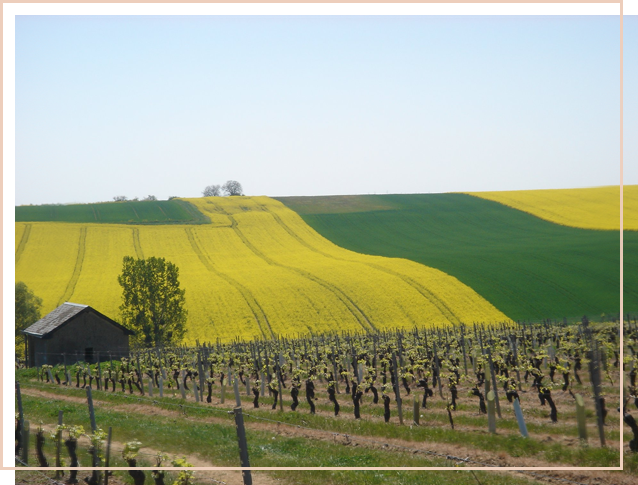
The winery of Reuilly was ranked in Appellation REUILLY d’Origine Contrôlée for his white Sauvignon as early as 1937, a year after the setting up of the Labels system on a national level, and in 1961 for the red Pinot Noir and the rosé Pinot Gris.
In the early 90s, Denis Jamain decided out of passion for the vineyard to take up the torch and acquire a beautiful set of plots in the town of Reuilly, a real starting point for the development of the Domaine.
After leading the operation in sustainable management for many years, he converted to organic farming in 2007 (certified by Veritas) and biodynamy in 2011 (certified by Demeter).
The Estate of Denis Jamain has four main places called: Les Coignons, Les Pierres Plates, Les Chatillons, Les Conges, on which 14 ha of White Sauvignon, 5 ha of Pinot noir and 4 ha of Pinot gris are planted.
The Domaine benefits from an exceptional land, mainly composed of clay and limestone of the Kimmeridgian era for the growing of its three grape varietals and also benefits from very favorable climate conditions for the good ripening of the grapes.
The winery in the immediate neighbourhood of the plots is equipped with modern, high-performance facilities and ensures perfect traceability of operations and products. It also offers hygienic conditions and an irreproachable sanitary environment.
Land of exception
The soil is an essential component of the quality of the wines, just like the selection of seedlings, the climatic conditions, and the work of the winegrower. Denis Jamain's Domain benefits from an exceptional soil. All the Sauvignon Blancs (12 ha) and the Pinots Noirs (5 ha) are planted on slopes facing south, south-west (15% slope on average) which allows them to benefit from maximum sunshine.
The soil that makes up these slopes is clay-limestone of the Kimmeridgian type, containing a profusion of marine fossils and shells which were left by the sea at the time of the Middle Jurassic, about 150 million years ago… It is this soil rich in limestone which gives the wine its specific minerality.
The Pinot Gris are planted on two plots of sandy-gravelly soil (4 ha), very well suited to this grape variety which requires light soil to promote the expression of its fruity aromas.
The Domain Denis Jamain, located at an average altitude of 160 meters, benefits from sunny conditions conducive to relatively early harvest (10 days, on average, earlier than the Sancerre vineyard) because there is no hinderance to bring the grapes to maturity. The harvest usually takes place in the first half of September and the weather conditions are generally excellent with lots of sunshine during the day, cool nights and little humidity.
Fully aware of the potential of this land for the production of characterful and authentic wines, Denis Jamain strives to manage his vineyard while respecting the soil and constantly protecting its terroir. This is what led him to practice organic farming and biodynamics on his estate.
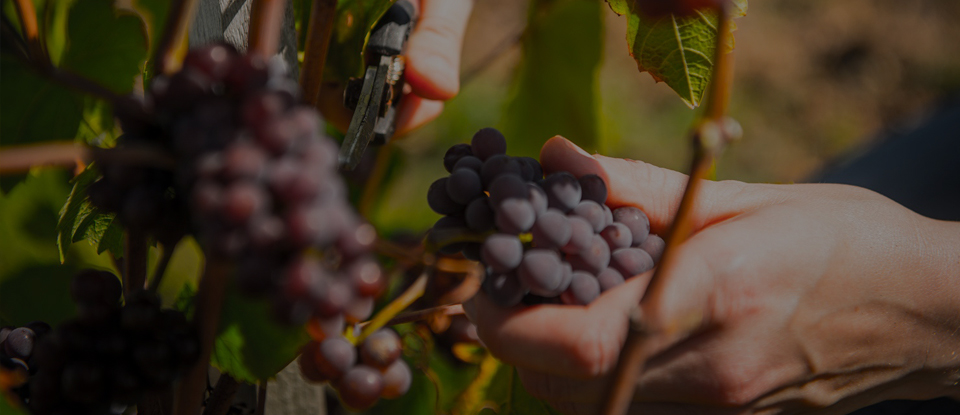
Respect
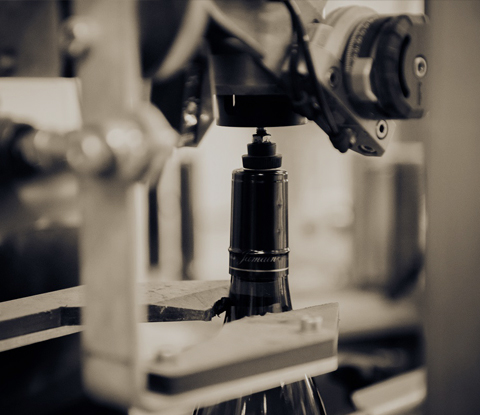
Rigour
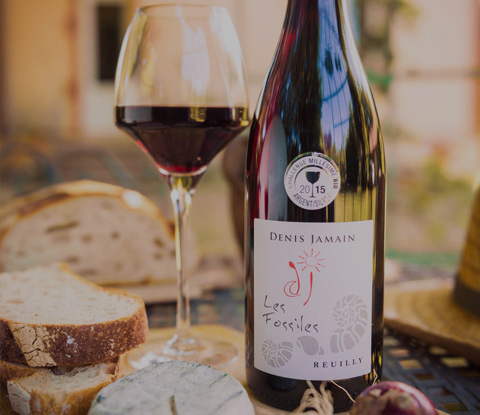
Excellence
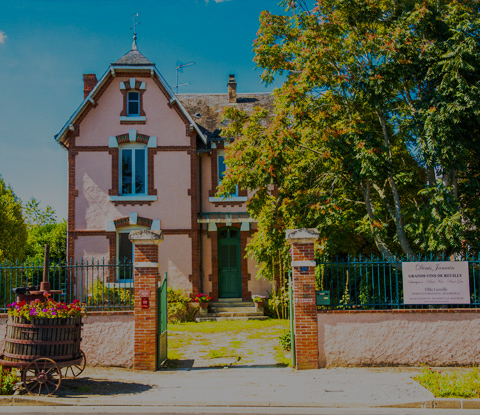
Authenticity
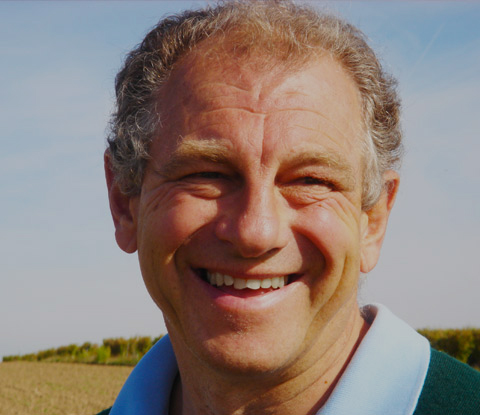
Passion
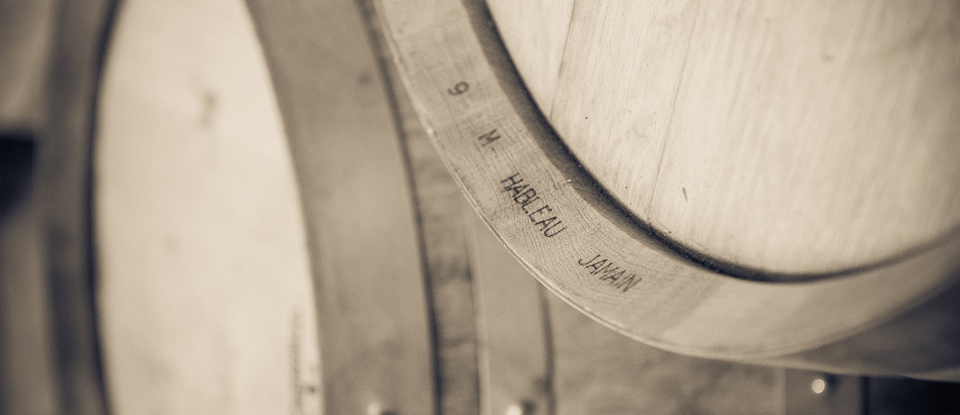
Personality
The passion of men of the Domaine de Reuilly vineyard at Reuilly (36)
Denis Jamain and Patrick Ragu, the crop manager, share the same passion for the profession of artisan winemaker they exercise. They both have a passion for excellence and always favor choices that can optimize the quality of grape cultivation and improve winemaking.
They consider that the land they work is a loan and that they will have to give it back, as healthy as possible, to future generations. This desire to respect the environment and the well-being of the land fully motivated their choice of organic farming and biodynamy for the management of the vineyard.
In addition to his passion for the vines, Denis Jamain has had an equal passion for trees since his childhood and he is lucky to be able to manage a family forest located 15 kilometers from Reuilly.
Biodynamy
The Domaine has followed for many years the cultivation in substainable farming. In this context, there was already controlled natural grassing on all the plots to:
- Promote deep rooting of the roots of vine plants
- Promote the microbiological life of the soil
- Ensure beneficial competition for the vine by limiting vigor
- Stop soil erosion
The green operations (debudding, desuckering, leaf stripping, green harvesting, etc.) all carried out manually, with great rigor, already made it possible to control production yields, on average 30% lower than the standards recommended by the label.
But the conversion to organic farming started in 2007 and to biodynamy in 2011 have taken the Domain a significant step forward in terms of respect for the environment and the health of its land and its vines.
"The health of man is a reflection of the health of the earth." This is the motto of the Estate which henceforth guides our action and which translates into the following actions:
- No use of synthetic chemicals for treatments.
- Permanent work of the soil done mechanically (ridging, starting, decompacting, weeding, hoeing, etc.) to aerate it and keep it alive.
- Respect for the lunar calendar and the position of the zodiac planets to carry out interventions on the vineyard in the appropriate periods (root days, flowers, leaves and fruits).
- Spreading of dung compost to ensure the good humic and microbiological balance of the soil.
- Spreading of horn dung and horn silica, which will have been energized beforehand, to promote rooting and vigor of the root system and stimulate the formation of limestone, potassium and iron.
- Sprays of herbal decoctions:
- Nettle which strengthens the iron process and has an anti-chlorosis effect.
- Dandelions which enhances the potash and sulfur processes in the plant.
- Oak bark which provides adequate structure of calcium in the leaf and sulfur in the plant.
Through these practices, all of the plant's natural defenses are sought to be stimulated by giving it positive energy.
Winemaking
The major principle that governs the winemaking methodology followed by Denis Jamain is very simple and can be summed up as follows: "to make wines as natural as possible and to promote the expression of the land and the aromatic compounds of the different grape varietals".
The winemaking principles followed are simple and in line with this philosophy:
- Ensuring the perfect state of health and optimum ripeness of the grapes upon entering the cellar: maturity checks of each plot, before and during the harvest period, are an essential component of the final quality of the wines.
- Work mainly carried out with indigenous yeasts from musts and limited use of active dry yeasts.
- Particular attention paid to temperature control during fermentation periods, to protect the aromas of the wines.
- Minimal use of sulphites to ensure the protection of wines.
- Appropriate aging of wines, whether in stainless steel vats or barrels. The cuvées in barrels have a minimum aging period of twelve months in oak barrels and twelve months in bottles.
- Very light filtration at the time of bottling in order to preserve the substance of the wines: some red cuvées are not filtered.
- Permanent assurance of compliance with all cellar hygiene conditions.

Wine tasting at the Domaine de Reuilly Discover the range of our certified organic and biodynamic wines
Your winemaker in Reuilly (36) is happy to welcome you throughout the week and on weekends with appointment to help you discover the range of his Reuilly Blanc, Reuilly Rouge and Reuilly Pinot Gris wines during a tasting at the estate.
The Cuvées of the Domaine de Reuilly (36), Indre
Denis Jamain, your winemaker, and his team welcome you to the Domaine in Reuilly in Indre (36) to help you discover the vintages of:
- Reuilly blanc
- Reuilly rouge
- Reuilly pinot gris
All the cuvées of Reuilly Blanc, Les Coignons, Pierres Plates, Fossiles and Les Chênes are 100% made from Sauvignon grapes.
The 3 cuvées of Reuilly Rouge, Pierres Plates, Fossiles and Les Chênes are 100% made from Pinot Noir grapes.
The three cuvées of Reuilly Pinot Gris-Rosé, Chatillons, Fossiles and Les Chênes are 100% made from Pinot Gris grapes.
The cuvée « les Chênes » in the three grape varietals are aged in barrels made with oaks from the family forest.
The distribution network in France of the Domaine de Reuilly (36)
The Domaine distributes its wines to a large clientele of specialist wine merchants, restaurants and delicatessen shops in all regions.
The Domaine also serves all its private customers with daily shipments throughout mainland France.
Alcool abuse is dangerous for health.
The life of the Domaine de Reuilly
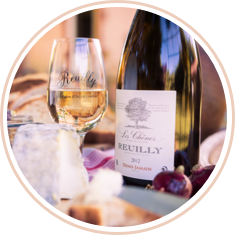
Tastings
Come and taste our vintages
Tastings
You are invited to come and taste the Domaine's wines every working day from 10 a.m. to 5 p.m. and on weekends with appointment.
Denis Jamain's Estate also offers the possibility of hosting large groups (up to 50 people) for an explanatory visit of the cellar followed by a tasting with local products. In this case, it is necessary to make contact several weeks in advance to set up a date and organize the conditions of the visit.
Accommodation and catering
Restaurants :
- Les 3 Cépages, Reuilly
- Les Saisons gourmandes, St Pierre de Jards
Accommodation :
- Les 3 Cépages, Reuilly
- La Fontaine au Tonneau, Reuilly
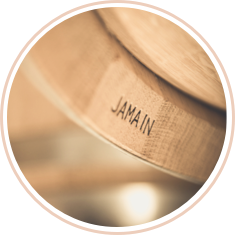
The family forest
The family forest provides the oaks for the manufacture of our barrels
The family forest
Anchored in Berry for several generations, Denis Jamain's ancestors bequeathed him two passions: the vine and the trees. He built his life in accordance with them. If the management of the vineyard is his essential occupation, he is fortunate to be able to manage a family forest, located 15 kilometers from Reuilly, which is one of the most beautiful forests in central France.
The trees of this region are world famous for the production of staves intended for vinification in oak barrels. Their growth is very slow which gives a fine grain which is essential for the good osmosis of the tannins of the wine with the wood.
He himself selects with a local merandier-cooper the bicentennial oaks that will be used to make the barrels for aging his white and red cuvées called "Les chênes de mon grand-père".
Through this rigorous selection of sessile oaks of very good quality produced on site, Denis Jamain is thus able to ensure full traceability of his wines produced in barrels.
Depending on the type of cuvée he seeks to develop, he determines in agreement with the cooper, the size of the barrels to be made, the type of toasting, the percentage of new barrels to be used, the aging time; all very meticulous work to produce excellent cuvées.
DISTRIBUTION OF DOMAINE DE REUILLY ON EXPORT MARKETS Reuilly Blanc Sauvignon, Reuilly Rouge Pinot Noir, Rosé Pinot Gris
The Reuilly Estate markets its range of wines in some twenty countries for export in North America, Europe and Asia. The Domaine has worked in partnership with importers for many years who distribute the Domaine de Reuilly wines through traditional networks (wine merchants, hotel-restaurants)
Alcool abuse is dangerous for health




